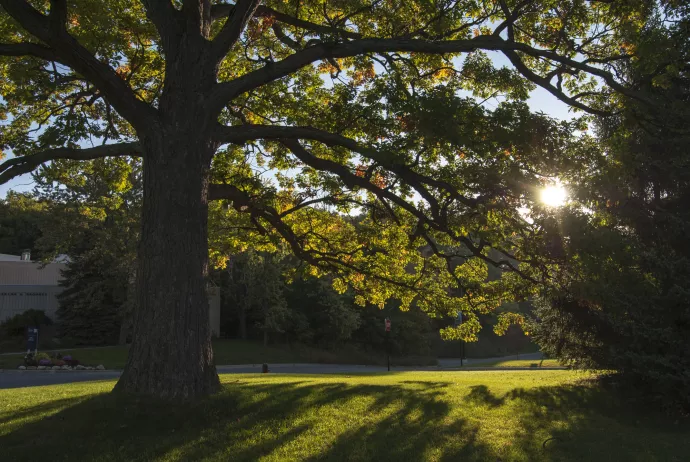UTM recognized with gold rating for sustainability achievements

University of Toronto Mississauga has entered a golden age of sustainability with a newly upgraded designation from an international organization.
Sustainability Tracking, Assessment & Rating System (STARS) is a rating system for colleges and universities that addresses the environmental, social and economic dimensions of sustainability.
UTM now has a gold rating, joining 161 other institutions currently holding that status. In all, nearly 350 colleges and universities from North America, Asia, Oceania, Europe and South America have active STARS ratings from “Reporter” to “Platinum,” the highest rating.
Since the U.S.-based Association for the Advancement of Sustainability in Higher Education (AASHE) launched the program in 2006, nearly 1,200 higher education institutions have registered to use the tool.
The application took the better part of a year to compile and the team's efforts were led by Beverley Ayeni, senior manager of sustainability and energy management. The application helps to establish a baseline of campus efforts by surveying groups and individuals from across the campus.
UTM first applied in 2020, receiving a score of 60 to earn a silver rating.
The initial STARS result was “a source of pride for our community,” said Ian Orchard, acting vice-president and principal. “It also encourages us to keep stepping up our game.”
Since then, Orchard noted, the campus has expanded efforts to include a hydroponic container farm that uses just five gallons of water daily to grow over 13,000 plants for campus eateries, and the new science building, which leverages geothermal technology and rooftop solar photovoltaic panels to use 65 per cent less energy than a traditional building of its size.
When it came time for STARS renewal, the Sustainable UTM team was able to offer an even more impressive report in the categories of academics, engagement, operations, planning and administration, and innovation and leadership. The upgrades added 18 points to bring the university’s STARS score to 78.59, resulting in the gold rating.
Ahmed Azhari, managing director, operations, sustainability and asset management, said he is pleased with the recognition, and even more so with the work behind the achievement.
“We are working to make the University of Toronto a leading institution in sustainability, to minimize our environmental impact,” said Azhari. “We teach sustainability, but it is also our mission to embed sustainability into the fabric of the university. As a leading institution, we should lead by example and demonstrate innovation, environmental responsibility and our commitment towards fighting climate change.”
As the second-largest division of U of T, UTM shares in the U of T distinction of being named the world’s most sustainable university in the 2024 QS World University Rankings, which evaluate post-secondary institutions for their environmental impact, social impact and governance.
UTM scored particularly well in academics, as a world-renowned research institution with many courses that are sustainability-focused and almost 92 per cent of departments engaged in sustainability research.
The additions of the UTM Sustainability Office and the master in science in sustainability management (MScSM), as well as UTM-launched student educator, waste ambassador and sustainability ambassador programs helped bump up UTM’s scores in the engagement categories.
In the air and climate category, UTM reported its maintenance of annual greenhouse gas emissions inventories, while the grounds category showcased the prioritizing of sustainable land management and biodiversity on campus.
Since 2023, the MScSM and Sustainability Office has also run Climate Camp, an initiative aimed at addressing climate anxiety and promoting climate education among children aged 8-12 in a positive and empowering way. The Climate Camp aligns with the civic engagement pillar of UTM's Sustainability Strategic Plan (SSP), specifically Goal 4.1, which aims to develop and strengthen partnerships with local elementary and high schools.
“Opportunities for sustainability exist across all departments,” says Ayeni, who led the creation of UTM’s first-ever SSP in 2020. “We are still in the early years of implementing the SSP, and already, we are making great progress across campus. I’m looking forward to embarking on future sustainability projects and fostering a culture of sustainability at UTM.”




